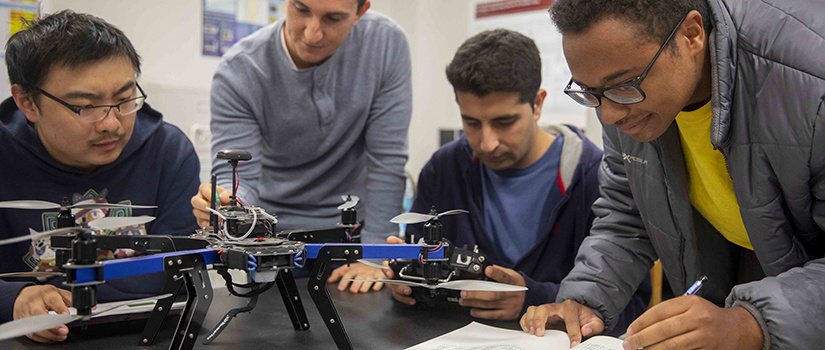Why Electrical Engineering Graduate Study?
A graduate degree in electrical engineering can improve your career by equipping you to work on advanced projects or enabling you to transition to a new career in research or teaching. Electrical Engineering at USC has advanced facilities, labs, computing and simulation infrastructure to allow students to carry out research activities.
We offer paid research assistantships and tuition for full-time Ph.D. students. Prospective students may also apply and receive national or international fellowships like the NSF Graduate Fellowship, National Defense Science and Engineering Graduate Fellowship, or fellowships from international entities and governments to support their Ph.D. program of study. M.S. students may also apply and receive very limited teaching assistantships or research assistantships, depending on the availability of funds. M.E. students are normally self-supported or supported by their governments, employers, or sponsors.
Programs of Study
The Electrical engineering Doctor of Philosophy (Ph.D.) degree focuses on graduate coursework and advanced research in one of the specialty areas in the department. A Ph.D. in EE is beneficial for many advanced research and development (R&D) jobs in industries, government labs, and other organizations as well as for academic faculty positions. Our Master of Engineering (M.E.) degree, is perceived to be more practically oriented and requires graduate coursework. Our Master of Science (M.S.) degree requires a thesis in addition to graduate coursework. Both M.E. and M.S. degrees may be more suitable for individuals who wish to acquire additional knowledge in the electrical engineering field to allow for growth and/or career advancement.
Visit Graduate Handbooks and Curricula for additional details.
If you have a few years and you've got what it takes, we want you here. Break new ground; publish world-changing research. If your aim is a career in academia or in an industrial or government research and development laboratory, you'll need to earn the highest degree an electrical engineer can get. Complete a research-based dissertation, grounded in 48 hours of coursework, in just four years beyond your B.S. degree.
Major components of the electrical engineering Ph.D. program include:
- Research resulting in a dissertation proposal, a dissertation, a dissertation defense, and 12 hours of dissertation credit
- A qualifying exam
- A comprehensive exam
- A total of 48 credit hours of graduate-level coursework in and related to electrical
engineering, comprised of:
- Up to 30 credit hours of transfer course work from a prior M.S. or M.E. degree may be applied
- At least half of the credit hours taken here from ELCT courses at the 700-level or above
Demonstrate your technical acumen and ratchet up your career objectives. This research-oriented graduate degree requires a thesis and 24 hours of graduate coursework.
Major components of the electrical engineering M.S. program include:
- Research resulting in a thesis, thesis defense, and 6 hours of thesis credit
- A comprehensive exam
- A total of 24 credit hours of graduate-level coursework in or related to electrical
engineering, comprised of:
- Up to 6 credit hours of directed study
- Up to 6 credit hours of coursework outside of but related to electrical engineering
- Not fewer than 12 credit hours taken from ELCT courses at the 700-level or above
Become a more-competent electrical engineer with just 30 hours of graduate course work beyond your B.S. This non-thesis graduate degree is especially great for working engineers who cannot easily get into a research laboratory.
Major components of the electrical engineering M.E. program include:
- A comprehensive exam
- A total of 30 credit hours of graduate-level coursework in or related to electrical
engineering, comprised of:
- Up to 6 credit hours of directed study
- Up to 6 credit hours of coursework outside of but related to electrical engineering
- Not fewer than 15 credit hours taken from ELCT courses at the 700-level or above
Areas of Specialization
Course work and research (for M.S. and Ph.D.) can be conducted in areas of specialization that coincide with the research interests of our faculty. Specialization areas include but may not be limited to:
- Power systems
- Power electronics
- Simulation environments for power electronics and interdisciplinary systems
- Microwave power amplifier and MOS devices based on wide bandgap semiconductors
- Growth device processing, and characterization of wide bandgap (SiC and GanN) semiconductors
- Nanoelectronics
- Electromagnetic metamaterials
- Wireless communication, antennas and RF systems
- Outdoor and indoor wave propagation
- Millimeter-wave integrated circuits
- Electronic packaging
Visit the Electrical Engineering Department for more information on our faculty and research areas
Graduate Admissions
All applications must be submitted to the Graduate School of the University of South Carolina. The Graduate School provides helpful information on the admissions application process and even lets you know what to do before you apply.
Admission is competitive. Normally, applicants are expected to have an earned baccalaureate degree in electrical engineering with at least a B average and to meet any other entry requirements of the Graduate School.
Test Scores:
Admitted students generally will have GRE scores higher than 153 (verbal) and 155 (quantitative). Students whose native language is not English must submit suitable TOEFL scores (generally above 80 computer-based score).
